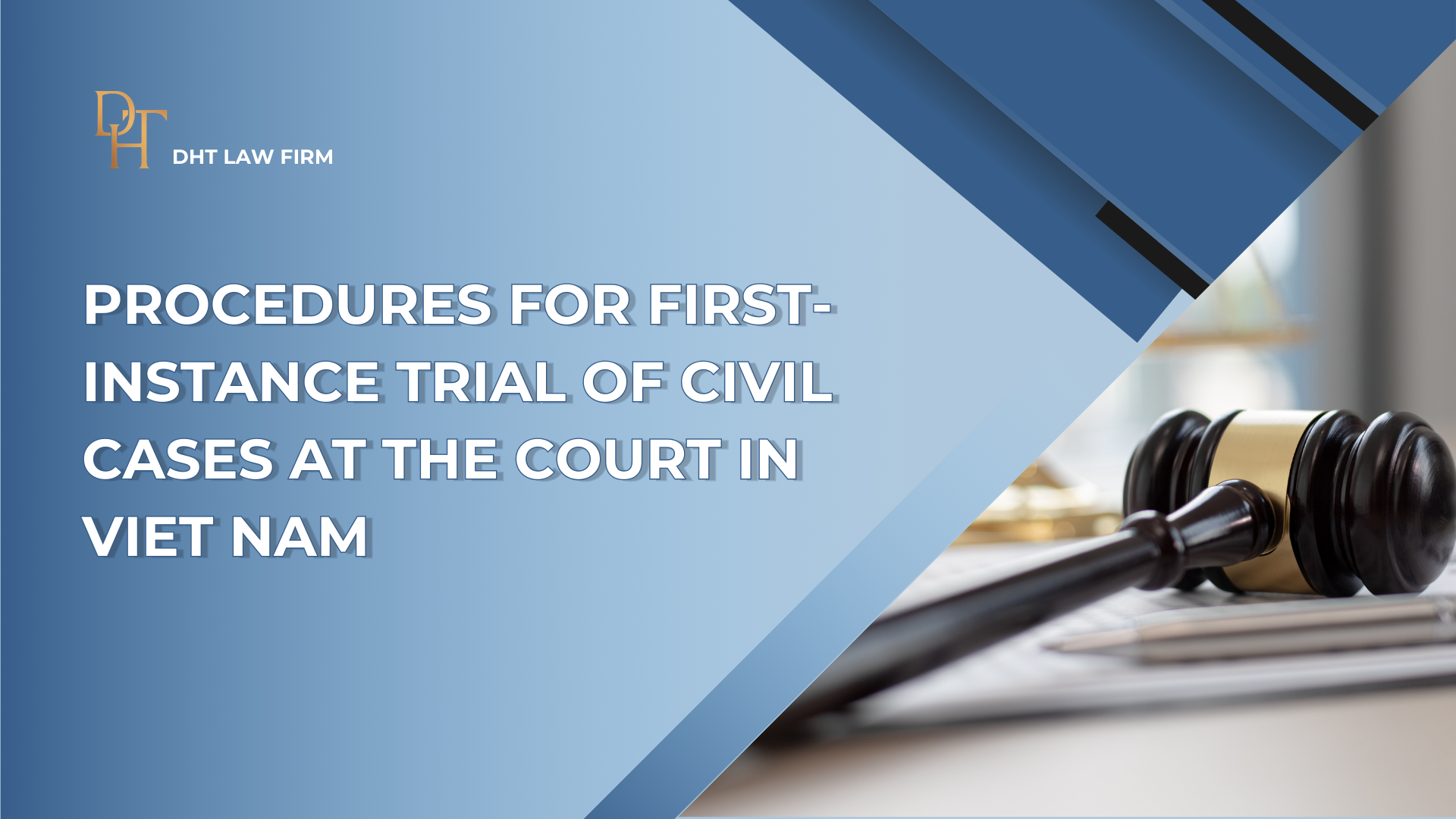
PROCEDURES FOR FIRST-INSTANCE TRIAL OF CIVIL CASES AT THE COURT IN VIET NAM
Newsletter by Legal Specialist of Dai Ha Thanh Law Firm - Dao Thi Nhat Trinh - Bachelor of Business Administration and Law from Ho Chi Minh City University of Law.
In Viet Nam, the Court resolve civil cases according to the two-instance trial principle (including first-instance trial and appellate trial), strictly applied according to current legal regulations. The First-instance trial is the first settlement of a case, plays an important role because the first-instance judgment will lay the foundation for the next steps, greatly affecting the final outcome of the case (Article 17 of The Code Of Civil Procedure 2015). If a favorable result is achieved at the first-instance stage, the disputing parties can avoid the risks, costs and complications of having to appeal to the appellate level. To ensure optimization of time and cost, the support of professional legal advisory units is essential. Below are the basic steps in the first-instance trial process of civil cases that the parties need to pay attention to.
1. What is a Civil case?
The Civil case arises from the dispute between the parties and one of the parties files lawsuit petitions to the jurisdictional Court. The civil case officially starts after the Court review the lawsuit petitions and accept it for settlement (Article 1, clause 1 of Article 4, clause 1 of Article 189, clause 1 of Article 190, Article 195 of The Code Of Civil Procedure 2015).
2. Conditions for institute civil case
Subjects must satisfy the following conditions to exercise the right to initiate civil lawsuits (clause 1 of Article 192 of The Code Of Civil Procedure 2015):
2.1. The subject have the right to institute civil lawsuits
- Individuals with full civil procedure act capacity, hold that their legitimate rights and interests have been infringed upon or have disputes, initiate lawsuits themselves or authorize others with civil procedural act capacity to initiate lawsuits on their behalf. Individuals without civil procedural act capacity shall have their lawful representatives initiate lawsuits on their behalf. (point a, clause 1 of Article 186 of The Code Of Civil Procedure 2015).
- Agencies, organizations initiate civil lawsuits to protect their legitimate rights and interests in case of infringement or disputes. In addition, agencies and organizations may also initiate civil lawsuits to protect the legitimate rights and interests of others as provided by law (point a, clause 1 of Articles 186, Article 187 of The Code of Civil Procedure 2015).
2.2. The cases falling under the courts’ jurisdiction (point đ, clause 1 of Article 192 of The Code Of Civil Procedure 2015)
- The case must be filed within the jurisdiction according to the type of case: The dispute must fall under the court’ jurisdiction according to Article 26, 28, 30, 32 of The Code Of Civil Procedure 2015.
- The case must be filed with the Court levels have jurisdiction as prescribed in Articles 35, 36, 37, 38 of The Code Of Civil Procedure 2015.
- The case must be filed with Territorial jurisdiction of courts according to Article 39 of The Code Of Civil Procedure 2015:
- Disputes over real estates must be settled by the Court where such real estates are located.
- If the parties have a legal written agreement to request the court where the plaintiffs reside or work (applicable to plaintiffs being individuals), or where the plaintiffs are headquartered (applicable to plaintiffs being agencies or organizations) to settle the case.
- If neither of the above applies, the court where the defendants reside or work (applicable to defendants being individuals) or where the defendants are headquartered (applicable to defendants being agencies or organizations) to settle the case.
2.3. The matter must not have been settled by effective judgments or decisions of the Court or legally binding decisions of competent State agencies (point c, clause 1, Article 192 of The Code Of Civil Procedure 2015)
If the matter have been settled by the Court or competent State agencies by legally effective judgments or decisions, the parties may not re-initiate lawsuits, except for the following cases:
- Judgments or decisions of the Court reject the applications for divorce;
- Request for change of child custody, alimony level, damage compensation level, change of property manager or estate manager;
- The case of claiming property, claiming property for lease, loan, house, land use rights for lease, loan or residence but the Court has not accepted the request because it is not eligible to initiate a lawsuit;
- Other cases prescribed by law.
2.4. The Statute of limitations for filing a civil lawsuit
The statute of limitations for lawsuits is the time limit within which an entity has the right to initiate legal action to request the court to resolve a civil case to protect the infringed legal rights or interests of the entity. When such time limit expires, the right to initiate such legal action shall be lost (clause 3 of Article 150 of Civil Code 2015).
The statute of limitations for lawsuit to request the settlement of civil, marriage and family, business, commercial and labor disputes is specified in the Civil Code 2015, the Commercial Law 2005, and the Labor Code 2019.
However, The Court shall apply the regulations on statute of limitations according to the requests for application of statute of limitations of one or multiple sides, provided that such requests are made before the first-instance Court issue the judgments/decisions on such matters/cases (clause 2 Article 184 of The Code Of Civil Procedure 2015).
3. Procedures for the first-instance trial of civil cases at the Court
3.1. Prepare lawsuit dossiers
Institution the civil case is the act of the litigator submit lawsuit petition to the competent Court to protect their legitimate rights and interests (Article 186, 187, clause 1 of Article 189 of The Code Of Civil Procedure 2015). The contents of a lawsuit petition must include the basic issues outlined in clause 4 of Article 189 of The Code Of Civil Procedure 2015, attach the necessary documents and evidence to substantiate the claim.
3.2. Filing the Lawsuit Dossiers
The litigator can submit the lawsuit petition, documents and evidence to the competent Courts to settle their cases through 03 methods (clause 1 of Article 190 of The Code Of Civil Procedure 2015):
3.3. Consider the Lawsuit petition
- Receiving and Processing the Lawsuit petition: After receiving the lawsuit petition, the Judge must make one of the following four decisions (clause 3 of Article 191 of The Code Of Civil Procedure 2015):
- Determining the court cost advance and Notifying the litigator: after receiving the lawsuit petition, the Judge must determine the court cost advance (if any) and immediately notify the litigator. The litigator must submit the court cost advance within 07 days from the date of receiving the court’s notification (Article 195 of The Code Of Civil Procedure 2015).
3.4. Accept the Case
The Judge shall accept the case upon receiving the receipt of the court cost advance or when the litigator is exempt from the court cost advance and submits the petition attach the necessary documents and evidence. Within 3 working days, the Judge must notify the involved parties of the acceptance of the case (clause 1 of Article 196 of The Code Of Civil Procedure 2015).
3.5. Prepare for First-Instance Trial
- Two types of time limit for preparing for first-instance trial with 2 different types of cases:
|
|
|
|
|
|
- During the time limit for trial preparation, depending on each case, the Judge will make one of the following four decisions (clause 3 of Article 203 of the Civil Procedure Code 2015):
- The meeting to verify the submission, access, disclosure of evidence, and mediation
- The meeting to verify the submission, access, and disclosure of evidence is mandatory (clause 1, 2 of Article 208 of The Code Of Civil Procedure 2015).
- The mediation meeting: Mediation in civil cases is mandatory, except civil cases which may not be mediated, civil cases which cannot be mediated, or cases settled under simplified procedures. (clause 1 of Article 205, clause 1, 2 of Article 212 of The Code Of Civil Procedure 2015).
Results of the mediation meeting
3.6. Holding the First-Instance Trial
- Within 01 month, from the date of the decision to bring the cases to trial, the Court must hold the court session. If there are valid reasons, this time limit shall be 02 months (clause 4 of Article 203 of The Code Of Civil Procedure 2015).
- Time limit for postponing the Court session shall not exceed 01 month or not exceed 15 days for the Court carried out under simplified procedure, from the day on which the decision to postpone the Court session is issued (clause 1 of Article 233 of The Code Of Civil Procedure 2015).
3.7. Judgment issue
The Court must send the judgment to the parties within 10 days from the date of the Judgment announcement (clause 2 of Article 269 of The Code Of Civil Procedure 2015).
3.8. Appeal/ Protest (if any)
- After the first-instance judgment or decision is announced, shall not take effect immediately. Parties have a timeframe to appeal, and the People’s Procuracy has a timeframe to protest. If an appeal or protest is filed against the first-instance judgment or decision, the higher court will conduct a retrial of the case (appellate procedures) (Article 270 of the Civil Procedure Code 2015).
- Time limit for appeal: 15 days from the date of the judgment pronouncement or from the date of receiving the judgment or the posted judgment (for parties absent from the court session).
- Time limit for protest: maximum 30 days from the date of judgment pronouncement or from the date the Procuracy at the same level receives the judgment (in cases the Procurator doesn’t participate in the court session).
3.9. Enforcement of Judgment
- The first-instance judgment or decision or the parts of the first-instance judgment or decision that are not appealed or protested under the appellate procedures take effect from the date the appeal or protest timeframe expires. The first-instance judgment that takes effect is published on e-portal of the Court.
4. DHT has successfully supported clients in many First-instance civil cases
DHT understands that each dispute has its own unique characteristics, requiring sensitivity and a flexible handling strategy, suitable for each client’s specific business context. Therefore, we not only stop at legal advice but also provide comprehensive support from the stage of preparing documents, filing lawsuits, to representing clients at the Court. With a team of experienced lawyers and legal experts, DHT has successfully protected the interests of clients in many First-instance civil cases in fields such as business, commerce, labor, civil, marriage, etc. DHT Law Firm is proud to be a reliable legal partner of many domestic and especially foreign clients, always ready to accompany and help clients feel secure in carrying out investment and business activities in Vietnam.
The above is the latest update from DHT Law Firm on the 2024 legal regulations related to procedures for first-instance trial of civil cases at the Court in Viet Nam. We, Dai Ha Thanh Law Company Limited, with our team of professionally trained Lawyers and Legal Advisors both domestically and internationally, are committed to providing professional legal services to our esteemed clients. If you need detailed advice, please contact us to receive professional and effective legal advisory services.
